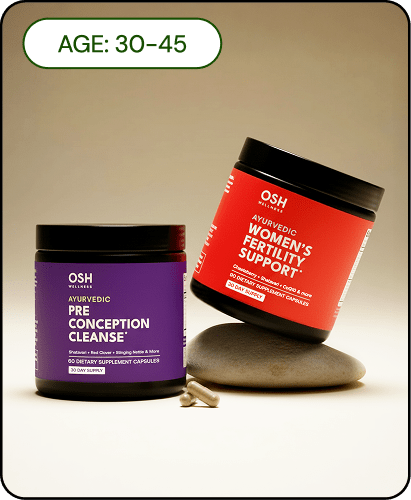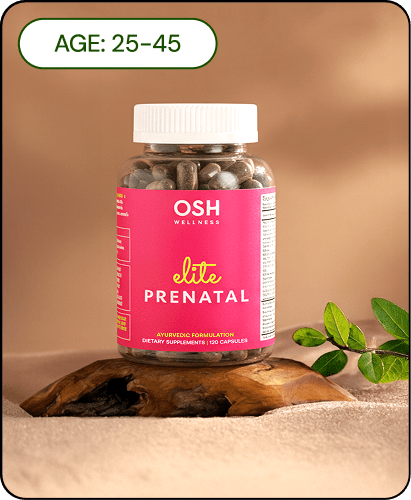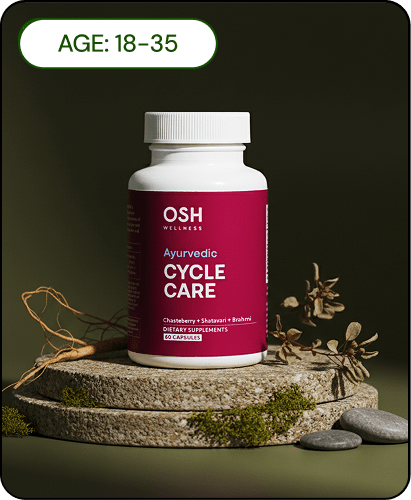We know how challenging it can be to wait for that positive test once you've decided to start a family! While there may not be a magical method for getting pregnant instantly, there are a few things you can do to increase your chances of conceiving quickly.
When it's time to expand your family, you'll want to start trying right away. But you should begin planning right away, too! Ayurveda actually encourages three months of planning before conceiving. You should spend this time nourishing your body, deepening your relationship with your partner, and promoting your mental wellbeing.
Getting pregnant isn't solely about having intercourse at the right time. You also need a supportive environment in the womb, your body, and the space around you. If you want to kickstart your journey to conception and pregnancy, consider giving these steps a try!
#1 Physical Health
The most important part of starting your TTC journey off on the right foot is focusing on your physical health. Your body will be your baby's home for nine months. You and your little one will rely heavily on your nutrient stores during that time. Additionally, your muscles and joints will be taxed as your baby grows and your body swells. Setting yourself up for a happy and healthy pregnancy in the future begins with getting your body ready now.
See Your Doctor
If you haven't been keeping up with your annual physicals, now is an excellent time to start. Your doctor can assess your overall health and guide you to make changes if necessary.
You'll also want to see your ob-gyn. They will be able to talk to you about all things pregnancy and conception, including pre-existing conditions and your family history. A regular check-up and a preconception check-up should be at the top of your to-do list.
As a bonus, you may want to visit your dentist too. Pregnancy can take a toll on your teeth; ensuring your pearly whites are in tip-top shape before you conceive can help prevent future dental issues.
Be Mindful of Your Lifestyle
First, aim for a healthy weight. Fertility can be affected if you are overweight or underweight. Being a healthy weight can help increase the chances of conception and decrease your risks during pregnancy.
Even if you're at your ideal weight, it doesn't hurt to get some physical activity. Exercise can help to reduce stress, improve cardiovascular health and muscle tone, and prepare you for pregnancy! Moderate exercise is often a great choice, as too much intense physical activity may adversely affect your fertility.
You'll want to curb unhealthy habits as soon as you and your partner see a baby in your future. Stop smoking, reduce your alcohol and caffeine intake, and go over your medication list with your doctor. These things can negatively impact your reproductive health. Still, they can also be dangerous to your baby when you become pregnant.
Nourish your body now to ensure your reserves are up to the challenge later. This means eating a well-rounded diet low in processed foods and refined sugar. Ayurveda believes certain foods, like ghee, sesame seeds, and warm milk, can help to make the body open and supportive of conception.
Additionally, you may want to start on a supplement. While some women begin with a prenatal, a complete fertility supplement may be more suitable when trying to conceive. The potent blend of vitamins, minerals, and herbs helps to reduce inflammation, balance hormones, regulate your cycle and support healthy reproductive functions.

#2 Womb Health
Discontinue Birth Control
Hopefully, you've already stopped taking your birth control. To make the womb a supportive place for conception, you should avoid hormonal birth control. The sooner, the better, as some forms of birth control can delay fertility returning even after you stop taking or using them.
If you've been relying on the pill or an IUD, especially for a long time, your body will need a few weeks to months to regulate. Taking fertility supplements may help your body regulate more quickly, utilizing preconception routine staples such as exercise, a nutritious diet, and getting adequate sleep.
Nourish Your Womb
Ayurveda believes in creating fertile ground in the womb by increasing warming foods that are rich and nutritious. This helps to decrease inflammation, boost moisture, and nourish the tissues of the reproductive systems. Milk and ghee, warming spices, and seeds are often the most sought-after. You should reduce raw, low-fat, and cold foods.

#3 Timing
You probably already know that timing is essential. While some people seem to get pregnant by surprise after only trying for a month, the window for conception isn't actually that long.
Conception generally has to occur within 24 hours after ovulation. However, more than one egg can be released from different ovaries in some months. Sperm can either wait for the egg from previously having intercourse or be introduced shortly after ovulation.
Track Ovulation
This means that you may want to track ovulation. There are various ways to do this. Some women learn to recognize their ovulation signs, including increased "egg white" cervical mucus, increased libido, or heightened breast tenderness. Other women prefer to use tools such as an ovulation tracker, ovulation tests, or a thermometer that measures basal body temperature.
It will usually take a few cycles to figure out when you ovulate. On average, women ovulate on day 14 of their cycle, but this is only if their cycle is the standard "28 days" in length. Ovulation can occur anywhere from 11 to 21 days from the first day of your last period, depending on how long your cycle typically lasts.
A calendar can help you track your signs and symptoms, cycle lengths, and basal body temperatures. Figuring out the pattern should help you determine when ovulation occurs for you each month, a.k.a. the perfect time to conceive!
#4 Intercourse
You likely already know the basics, but did you know there are certain things you can do to help and hinder conception?
Time It Just Right
Most importantly, you'll want to time it just right. This means you'll want to have intercourse every other day, usually only once a day, immediately preceding and following ovulation. This is considered your fertile window. If you don't have sex enough, there may not be any sperm to fertilize the egg. Alternatively, having intercourse too much could decrease your partner's sperm count.
Consider Helps and Hindrances
If you want or need to use lubrication, make sure it's sperm-friendly. Some types of lubrication can kill off sperm, while others simply make it more difficult for them to swim to the egg. Similarly, using vaginal cleansers or douching can hurt sperm and lower your chances of conceiving.
You don't really need to use any special position or technique. However, some women prefer to lie on their back with their legs up, perpendicular to their torso, after intercourse. While it may not be scientifically proven to increase your chances of getting pregnant fast, go for it if it gives you peace of mind!

#5 Mental Wellbeing
Throughout your conception journey, it's essential to be mindful of your mental wellbeing, which can be easier said than done!
Try to keep intercourse fun and romantic. Putting undue pressure on your partner and yourself can lead to stress, disagreements, and take the passion out of pursuing pregnancy.
Additionally, try to stay positive, even if you don't conceive on the first cycle. Only 38% of healthy couples, at most, get pregnant within the first month of trying, found one study. By three months, 68% had conceived, and 92% had become pregnant by one year.
In most cases, your doctor will advise you to try for a year if you and your partner are healthy and thirty-five or younger. One in eight couples has difficulty getting pregnant and/or staying pregnant. Even if you're facing challenges, know that you're not alone.
Patience is Key
Getting pregnant often takes patience, a skill you'll need as a parent. Being proactive by taking the steps above may help you become pregnant quickly, but it will also set you and your future little one up for a healthy pregnancy and postpartum period.
Related Products








